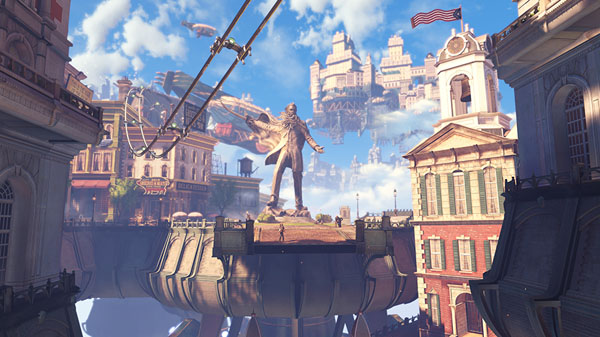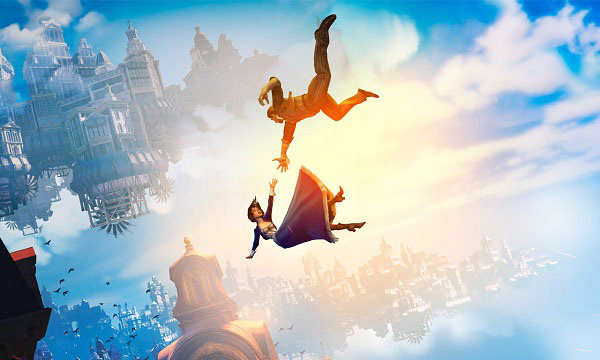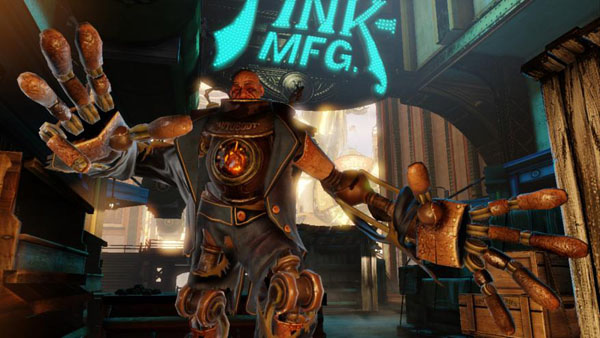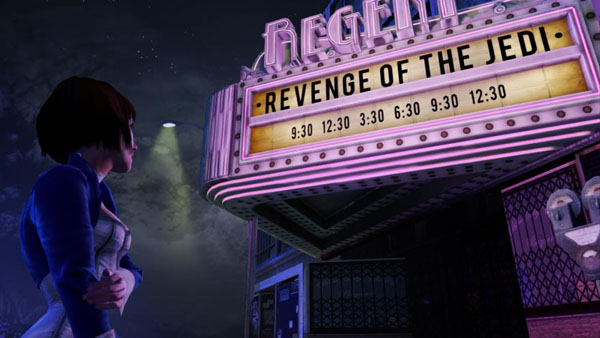With the launch of one of the biggest games of the year just around the corner, SFL caught up with Bioshock Infinite's Ken Levine to talk movies, risk and secret cities in the sky.
Sat at one end of a rowing boat lurching atop a wild dark sea as heavy rain hammers down, former detective Booker DeWitt has taken on one last job to try and clear his mounting debts. Following a trail of blood and carnage to a creaking lighthouse, he is in search of young woman and is tasked with her rescue. Lying in wait at the top of the lighthouse is a crimson red leather chair that would look perfect in Sweeny Todd’s parlour and is a stark reminder that in a Bioshock game, seemingly idyllic paradises are anything but and danger lurks around every corner.

Above the clouds, softly chugging in the bright sunshine against a piercing crisp blue sky drifts Columbia; a giant city built by the US Government in the late 1800s to serve as a floating world’s fair. The city was sent to travel from continent to continent and show the rest of the world the success of the American experiment but disappeared and is now hidden from the world below. Locked away in one of the secret city’s towers is Elizabeth. Imprisoned since childhood, her freedom depends on Booker and the two create a formidable and emotional partnership in what is shaping up to be a game that’s going to pack one hell of a powerful narrative punch.
“I knew it with Big Daddy and Elizabeth; without them there was no game.” Levine tells us, referring to the iconic, genetically enhanced, diving-suit clad guardians from the original Bioshock game as we start talking about his female creation. “Bioshock Infinite is so much more character driven. Both Booker and Elizabeth dominate the story throughout. It features a lot of events though it’s really about how these characters are changed by these events, what it does to them, how it affects them. That’s something I hadn’t really done before, certainly in a first person game."
With no lengthy cut scenes breaking up the action, as a player you’re not just observing other characters and their relationships, nor are you guided though Columbia by a tinny voice over a radio. Infinite requires players to become fully immersed in the world and be part of this intense relationship in a way that is crucial to the narrative. Levine explains “In the first Bioshock, there were characters absolutely but they were… well the lead character was a nonentity by design. I view it as, and I’m only starting to realise this after the fact, a progression and we try to engage the player rather than just have them watch it. Where before you observed the relationship between Big Daddy and Little Sister, in this game, you are part of a relationship and that’s a risk but I think if we can pull that off and that for a first person game that will be pretty special.”

Risk. It’s clearly something Levine and the Irrational Games team weigh up carefully and use to inform crucially big decisions as part of their development process. He pauses to have quick gulp of cola whilst glancing over to a huge promotional poster of Elizabeth before continuing. “The reason we didn’t do Bioshock 2 was we didn’t perceive enough risk. There is a relationship between risk and reward right? We didn’t feel we had another story to tell with Rapture. We may one day have a story to tell, I don’t know, but we felt we didn’t have one centred on Rapture that wasn’t going to be repeating ourselves. Generally, the things that are the most risky, cause the most controversy in the team. In BioShock 1, there were many people who wanted to cut the Big Daddy because nobody really knew what to do with them. With Elizabeth, there was a lot of that too. In early level reviews, Elizabeth was literally back in the closet and didn’t appear because they didn’t know what to do with her, none of us did! I didn’t really understand. It was the last year I had her character developed from a narrative standpoint and really integrated her into the game on a deep level. It came out of building her role and making her feel like a partner to you.” Here Levine gets animated and talks at speed, throwing his hands around, pointing and clicking his trigger fingers “You never have to protect her. She is your partner in crime. That feeling when your gun clicks dry and you hear ‘Booker!’ and she tosses you a gun, that feeling of cohesion is really great. I didn’t want her to be cowering in a corner. She is engaged, this is her struggle too. She was locked in this fucking tower and she’s not going back! They are terrified of her. Making a connection with her was really important. It was a risk but when you get people on the team saying ‘Oh my god, we shouldn’t do this’ either you’re really in the wrong place or really in the right place.”
Narrative is what drives Levine and is how he ended up eventually working in the games industry after originally setting his sights on a career in the movies. “I was hired by Paramount to re-write a screenplay of theirs and I didn’t do a particularly good job. I was 21 or something, and all of a sudden when the script didn’t work out, all these people that I thought were my friends stopped returning my calls. I was really too young for understanding that that was going to happen. I sort of curled up and went away for a few years. I became a computer consultant and then I realised ‘Holy shit! I’m almost thirty and I don’t wanna be a computer consultant for the rest of my life. What am I gonna do?’ I’ve always played games and I saw 'Game Designer' in a job listings. I still don’t exactly know why the guys hired me, I mean I’m not just being coy here – I didn’t have demonstrate-able talent or experience yet they put me in a room with one of the great game designers of all time Doug Church and I got to work on Thief. Even if you are the most talented guy in the world, even if you’re the best game designer that ever lived, the fact that you show up at a company and they put you in a room with this guy, on your first week there, with no real reason, I have to say – that doesn’t get to happen to a lot of people, I really really lucked out. The timing in the industry, how young it was and the fact that narrative - which happened to be one of my strengths - was so under explored at that point meant that all of a sudden I could make these games and they felt very fresh and new. If I were to come on the scene now, it would be much harder to make that kind of impression because narrative has advanced so much.”

So does Levine enjoy playing narrative driven games as well as creating them? “I think people seem to really care about narrative and that’s a good thing for me as a creator. As a gamer, I’m mixed. I do enjoy some narratives, I also really enjoy systemic games like Civilisation and XCOM, those sort of old school games. I also loved Half Life and I enjoyed Portal a lot. Narrative is how people are used to experiencing stories and I think there are some people who play games strictly for narrative. The Walking Dead is basically strictly narrative. They did a great job and there’s not necessarily a lot of ‘game’ there but that’s ok because people really responded to it. So it’s interesting to see how it evolves. If people talk about Infinite in terms of its narrative over other things then that’s ok, it’s certainly better than people saying it’s a shitty narrative!”
Our chat about narrative inevitably turns to movies and again, Levine gets most animated when talking about risk. “I tend to like… not mystery but some opacity that can be very powerful, where you’re asking what exactly is going on here. I love Paul Thomas Anderson’s films because they are so opaque in a lot of ways. I love that at the end of The Master he was brave enough to a risk. I think that games try to be fairly explicit so a player knows everything that’s going on. The Star Wars and the Lord of the Rings school gives you a pile of exposition upfront because they wanna fill you in as much as possible. I prefer it when players become an active participant and feel like they have to be on their guard.”

Columbia has a similar aesthetic to Rapture’s underwater location with attention to detail on every scale from the small brass bolts on the plates that shift and join sections of the city together to the idealistic beauty of marbled fountains and statues. We wandered into an old grocery store where a sign encouraged us to be honest and pay for what we needed whilst the shopkeeper was out. There was a celebration happening in town so red, white and blue bunting hung on every street corner. We paused to listen to ‘Columbia’s gayest quartet’ entertain the crowds from a hovering airship with the music of tomorrow – a barbershop quartet version of God Only Knows by the Beach Boys before heading over to some Carnival stalls to try our luck on the shooting galleries. Despite winning some handsomely designed bottles that give Booker unique, augmented powers where he can throw fireballs or control machinery and ravens, the underlying threat that rippled under the veneered surface couldn’t be ignored. Dotted around Columbia are Kinetoscopes; end of the pier type viewers where saucy sepia chamber maid films have been replaced by propaganda messages about all the amazing things Father Comstocks, the devout leader of Columbia, has done. Snippets of conversation on the streets are loaded with pious and dutiful observations whilst posters emblazoned on billboards warn against the coming of the False Shepard who will be known by a branded mark on his hand. When the action kicks in, it quickly kicks in hard and brutal which is thrilling, explosive and frightening.
“I said a few weeks ago that the ending is, I think, is the best ending we’ve ever done – it is the best work Irrational has done” says Levine who remains modestly cautious when discussing the hype surrounding the coming launch. “Even after I said that, I was like, I don’t wanna be setting expectations because for all I know, everybody will play it and hate it. I know how I feel about it. If people listen to me sometimes, maybe it's because they think I’m trying to give them relatively objective information rather than… I mean hey, I didn’t come to London for my health! I’m here as a spokesperson and a salesman in some cases but that doesn’t mean I have to say things I don’t believe in, even to the point where I’m nervous about saying things I do believe in because the person I’m talking to might not necessarily agree. I just give information more than anything else but I will say that I felt personally, in retrospect, the ending in Bio 1 didn’t wrap up after the Ryan thing, so it was very important to me that we really put a lot of care into making sure you stayed with Booker and Elizabeth for the entire story and that you really would never really knew what was going to happen until the very end. And the ending is not a very traditional ending.”
After exploring only a fraction of what Columbia has on offer, we recommend that everyone does take note of Mr. Levine’s words as Bioshock Infinite is a tense and emotional ride through the skies.
Bioshock Infinite is due out on 26th March for X360, PS3 and PC.